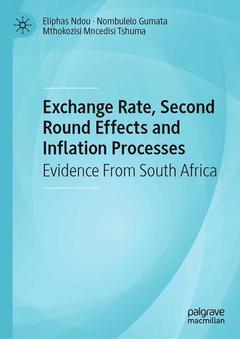Description
Exchange Rate, Second Round Effects and Inflation Processes, 1st ed. 2019
Evidence From South Africa
Authors: Ndou Eliphas, Gumata Nombulelo, Tshuma Mthokozisi Mncedisi
Language: English
Subjects for Exchange Rate, Second Round Effects and Inflation Processes:
Keywords
Second-round effects; Counterfactual responses; Exchange rate pass-through; Time varying exchange rate; Monetary policy credibility; Fiscal policy credibility; Time varying interest rate pass-through; Consumer price inflation; Oil price inflation; Exchange rate depreciation shocks; South African credit markets
89.66 €
In Print (Delivery period: 15 days).
Add to cart416 p. · 14.8x21 cm · Hardback
Description
/li>Contents
/li>Biography
/li>Comment
/li>
This book focuses on the exchange rate pass-through (ERPT), second round effects and the inflation process in South Africa. The authors demonstrate that magnitudes of the second round effects of the exchange rate depreciation and oil price shocks depend on inflation regimes. The impact of positive oil price shocks on inflation is weakened by monetary policy credibility. Evidence shows the influence of oil price on unit labour costs and correlation between exchange rate changes and inflation has weakened. In addition, ERPT is reduced by low business and consumer confidence, high trade openness, low inflation and high exchange rate volatility which weaken real economic activity. Both monetary and fiscal policy credibility lowers the sizes of ERPT to inflation and inflation expectations. Fiscal policy via fuel levies, administered prices and public transport inflation channel impacts the responses of monetary policy to inflation shocks. The authors show that second round effects contribute very little to wage inflation following an exchange rate depreciation shock. Both lending rate and household consumption responds asymmetrical to repo rate changes.
This book will appeal to policymakers, students, academics and analysts.
Eliphas Ndou is an economist at the South African Reserve Bank, and lectures at the University of the Witwatersrand, South Africa. He holds a PhD in economics from this University. He has co-authored 8 books in the areas of international finance, inequality, inflation, monetary and fiscal policy, applied macroeconomics and labour economics, and macroprudential policy.
Nombulelo Gumata is an economist and holds a Master’s degree in economics from the University of Johannesburg, South Africa. She has co-authored several books in the areas of money and banking regulation, international finance and macroeconomics, macroprudential tools and financial stability, labour markets, monetary and fiscal policy.
Mthokozisi Mncedisi Tshuma, holds a PhD in Economics from the University of the Witwatersrand, South Africa. He is Senior Sector Expert in the National Planning Commission Secretariat, South Africa.




